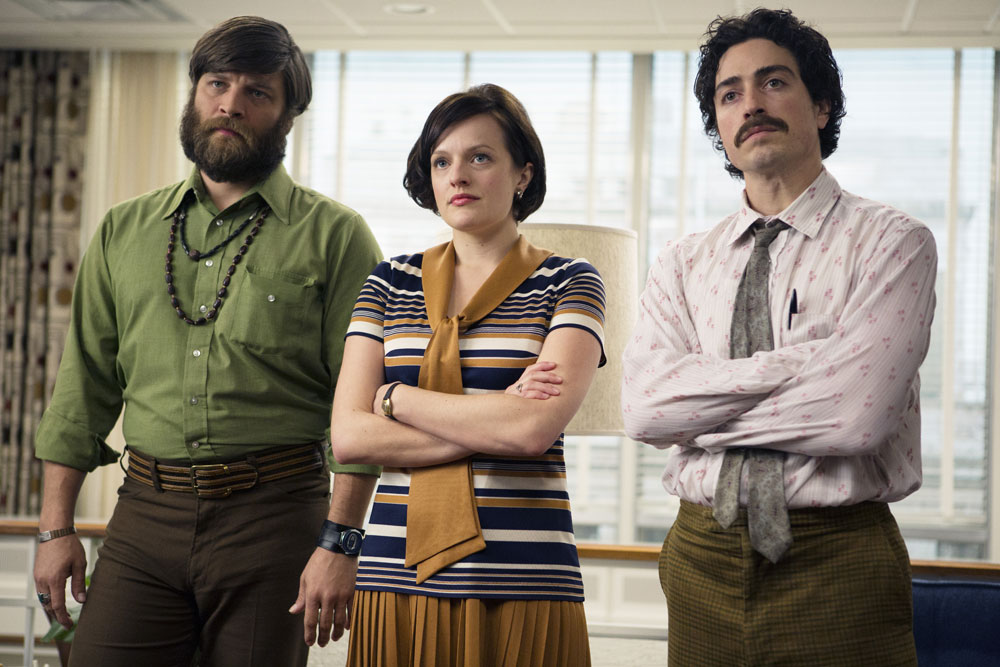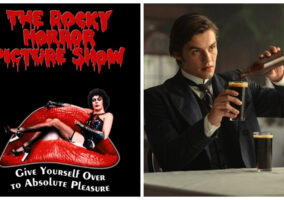Jay R. Ferguson, Elisabeth Moss and Ben Feldman in AMC’s “Mad Men”
If each season of Mad Men is a novel – and since the show’s literary aspirations are in its DNA, we’ve always seen it that way, with each episode a chapter and each season/novel part of a larger, ongoing story (Proust with miniskirts) – you sometimes have to stand back from it and look at the whole to get a sense of how well it worked. We have always had to rewatch an entire season after it aired in order to properly gauge its quality. It’s why our weekly reviews are so heavy with critical analysis but relatively light on actual criticism. When we rewatched season 6, we came to the conclusion that it was easily our least favorite season because the writing had gotten broad to the point of farcical. Pete’s mother got murdered on a cruise ship by a gay, Spanish gigolo? That doesn’t even sound like Mad Men to us.
In a similar vein, we never quite bought Matthew Weiner’s explanation for Joan’s prostitution. It was a character moment that made some sense thematically but made very little sense given what we’ve seen about that character for most of her existence. Joan would sleep with a man to get a partnership out of it, but she’d never have done it knowing that half the office – and all of upper management – were going to know about it. Weiner’s point was that this was the natural progression for a character looked on as merely a set of female physical attributes by the men around her. Our counterpoint was always that Joan is a character all about control of her image and what people get to know about her. And besides, she wasn’t exactly destitute when she agreed to it. She had a well-paying job and a two-bedroom apartment in Manhattan. As single mothers in the 1960s go, Joan was doing all right, if not particularly great; especially considering she had no higher aspirations for the bulk of her career.
Our point here is two-pronged: the writing on the show has gotten too broad and unsubtle, and the creators sometimes fail to sell the actions of the characters properly. These are the two major criticisms we have of the latter seasons of Mad Men and they were on full display in this episode. We thought last week was the chapter where all the people Don pissed off got to ask for their pound of flesh. We found out this week that it wasn’t a one-time thing. That’s the story now. Everyone Hates Don.
Which is fine, because the show has done its job in selling what a shithead the character is. We don’t have an issue with Don being brought low or having no allies. But having worked in offices for several decades and in advertising for the better part of one of them, we found the politics here to be hard to swallow. As the show – and Don himself – keep reminding us, he’s a senior, founding partner of the agency. There literally would have been no agency without him and it would have remained a farm-team, lower-level one if he hadn’t taken the bold move to propose a merger with CGC. Everyone who’s treating Don like crap now has benefited tremendously from Don’s work. Sure, people are short-sighted and petty (Peggy seems to be the queen of that little group at the moment), but no agency would take its star creative person and founding partner and treat them like a junior staffer just because he had a drunken crackup in one meeting. The optics of it would look terrible once it got out – and it will get out, since the ad industry of the time was notoriously incestuous and prone to gossip. And since when was Hershey the be-all and end-all of all clients? It’s not the first client Don – or anyone else in this story – has lost. The punishment far outweighs the crime here. And Peggy has been driven to tears this season in part because no one around her cares about the creativity or the quality of the work. Is she really so petty as to treat the man she knows is a creative genius like a junior copywriter?
This is not a defense of the privileged white man and his innate right to always be forgiven his many transgressions. Don deserves a lot of anger that he’s getting, but it’s really hard to explain just why people like Joan, Peggy, and most confusing of all, Bert, seem to hate him so much now. The way Joan and Peggy were talking, you’d have no idea they were discussing the one of the few men in the office who ever treated them with respect for the bulk of their careers. The father of Joan’s child gave her the go-ahead to prostitute herself and Don’s the one she saves all her anger for? Ginsberg makes crude masturbation jokes about Peggy in work, Pete spent several years humiliating her, and Ted slept with her and dumped her, but Don’s the one she wants to punish?
Fine. Argue that it’s transference, then. That Joan and Peggy are mad at other people and taking it out on Don. It’s not there in the writing, but we might accept that as an explanation. But Bert? The Randian lion, refusing a pitch for new business because it came from Don? Since when does that make sense for the character? He’s long been established as someone with very little in the way of morals when it comes to business. Why is he so offended by Don that he’d dismiss a good idea like that? Especially by making such a crudely over-the-top remark about sharing a dead man’s office? That wasn’t Bert sounding coldly Randian so much as sounding like a Bond villain. “I don’t like the way this office is spoken of” isn’t an explanation for essentially telling someone to go kill himself.
And continuing that over-the-top feeling, here comes progress, literally ripping out creativity to replace it. “It’s not symbolic.” “No, it’s quite literal!” We’ll give them that. At least they can see they’re being unsubtle about it. But the replacement of the creative lounge (“Your lunch room,” as Harry sneers) with a gigantic 1969 computer is pretty on point for the period and is yet another aspect of the story signaling the conservative, money and status-oriented years to come. The death of creativity and the rise of corporatism. We always assumed the show would transition from looking like the ’50s to signaling the coming ’70s at some point. And it did, starting last season. But we’re pleasantly surprised to see they’re foreshadowing the ’80s as well. After all, they were as much a response to the ’60s as the ’70s were – probably more so. But this episode’s script and/or directing was lacking, so the scenes where Don and Lloyd discuss computers and their meaning to the world came off rather annoyingly stiff and un-natural. “Isn’t it god-like that we’ve mastered the infinite?”
Mad Men likes to go all dream-like every now and then and that’s fine. But there’s a fine line separating the establishing of a dream-like atmosphere and getting all stagey and weird and unrealistic. Perfect example – and the one that signaled the weird unsubtlety of this episode: the receiver hanging off the hook as Don came into the office, adding to that unsure-of-himself feeling established in the opening shots of his scared face in the elevator. One problem: it makes no sense for a phone to be left dangling like that just because an office-wide meeting was called. It was all visual with no real world correlation to it. The show getting a little up its own ass. And since we’re getting all whiney about it, we might as well continue and say that we found Don’s drunken “Satan, I cast thee OUT” bit with Lloyd to be more than a little silly. Remember last season when drunken Don was being shuffled onto his elevator by Pete and Ken after Mrs. Sterling’s funeral and he asked his doorman what he saw when he almost died? “Was it the ocean?” That’s how you get a drunken character to say a universal truth or reveal a deeply held sentiment and still sound like a drunken character. “You go by many names!” Oh, please.
But to be fair, this episode did a really good job of showing that SC&P is so dysfunctional at the moment because everyone involved has a different agenda and no one really communicates with each other anymore. Even at moments of connection, like the much welcome one between Joan and Peggy, information is withheld. Peggy asks if Don is breaking the rules set out for him – which he is – but Joan doesn’t really follow up on it. As Lou said to Peggy when he gave her a rather hefty raise, nothing’s worth anything around those offices unless it’s written down (Don’s contract and shares being the only thing keeping him there, for instance). It’s no coincidence that all those bi-coastal telephonic partners’ meetings (including the one this episode) are practically monuments to the concept of miscommunication. The company is fractured and all its principals want different things from it. Not to mention most of them seem to be desperately unhappy people. The grudges, counter agendas and secrets are piling up so high that SC&P is either a slowly decomposing garbage heap or a bomb ready to go off at any second.
In other news, the Sterling family go on a trip. Thank God for Mona Sterling, who came along at just the right moment to inject some get-the-hell-over-yourself attitude into the proceedings. Talia Balsam had her best outing ever as the character, dropping zingers left and right in the manner only a fed up mother and ex-wife can. “These people are lost and on drugs and have venereal diseases.”But it wasn’t all comedy in the end. All of Roger’s sins came back not to haunt him, but to almost literally roll around in the mud with him. Margaret may have told him he was forgiven, but Marigold let loose with a lifetime’s worth of deep hurt and anger that revealed he was anything but. The story has always shown us parallels between Don and Roger’s lives. Roger and Mona were held up as the distant, resentful couple Betty and Don were threatening to become. Roger got divorced and married Don’s secretary and after judging him harshly for it, Don turned around and did the exact same thing. “See? This is how to live,” said Roger at the news, noting the similarities of their paths. And now, Roger and Don have both been forced to deal with angry daughters who have good reason to be so, and who are in danger of becoming more like their fathers than they’d ever have wanted to be. Walking to the train station, covered in mud and defeat, Roger’s just as much on the bottom as Don is. We fear the story’s only going to give one of them the option of bettering himself. And Roger lacks the one thing Don has right now; the miraculous discovery that he has a friend looking out for him. Freddie Rumsen, of all people. How perfect. Once again we point out the opening words of this season, spoken by him (but written by Don): “Do you have time to improve your life?” To that cri de coeur masquerading as ad copy we can add his best lines yet: “What the hell are you doing? I mean are you just gonna kill yourself? Give them what they want? Or go in your bedroom, get in uniform, fix your bayonet and hit the parade. Do the work, Don.” Hell, yes. It wasn’t our favorite of episodes, but that might be one of our favorite moments in the show. That’s beautifully full-circle. Don and Roger pushed Freddie into a cab and wished him well when his life fell apart. He’s clearly a better man than they are. He might turn out to be the best of them all, given how sour and nasty most of the characters are now. Freddie Rumsen. Of all people. The ultimate hero of Mad Men.
Much more to come in our Wednesday Mad Style entry.
[Photo Credit: Justina Mintz/AMC]
“Everyone Wants To Be Me Or Do Me” New York Party Next Post:
Michelle Obama in Marchesa at the 2014 WHCA Dinner
Please review our Community Guidelines before posting a comment. Thank you!




